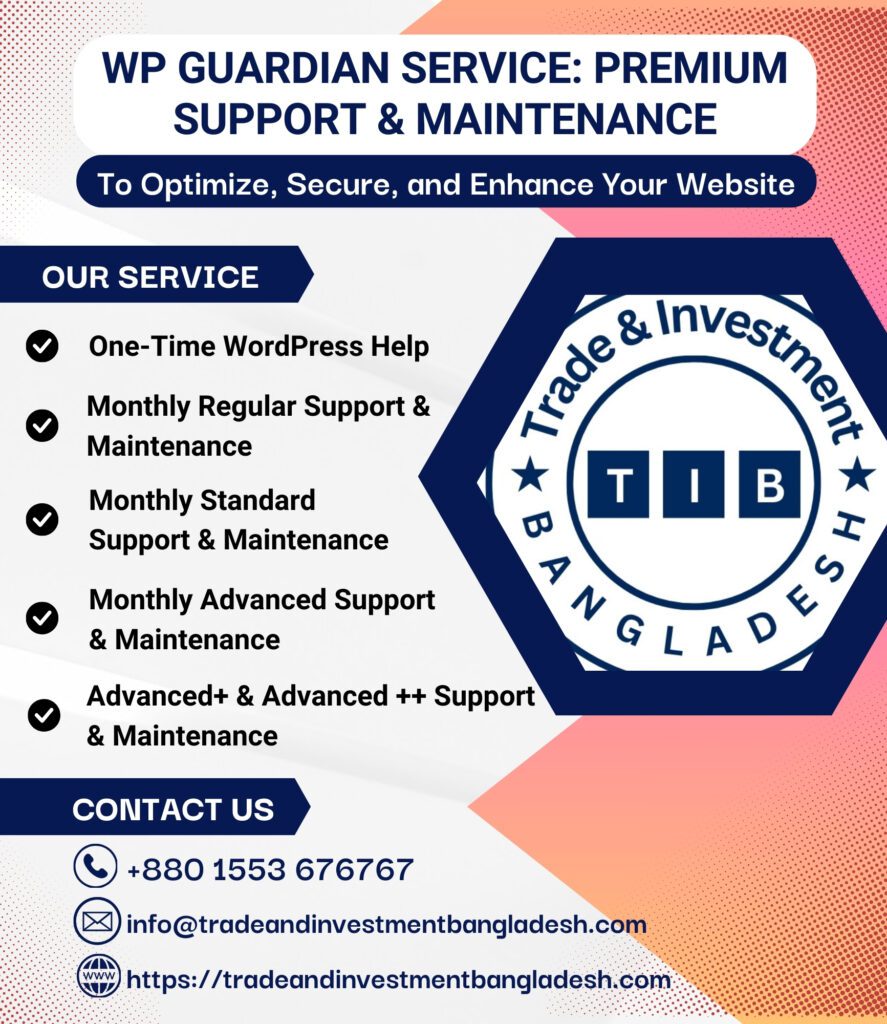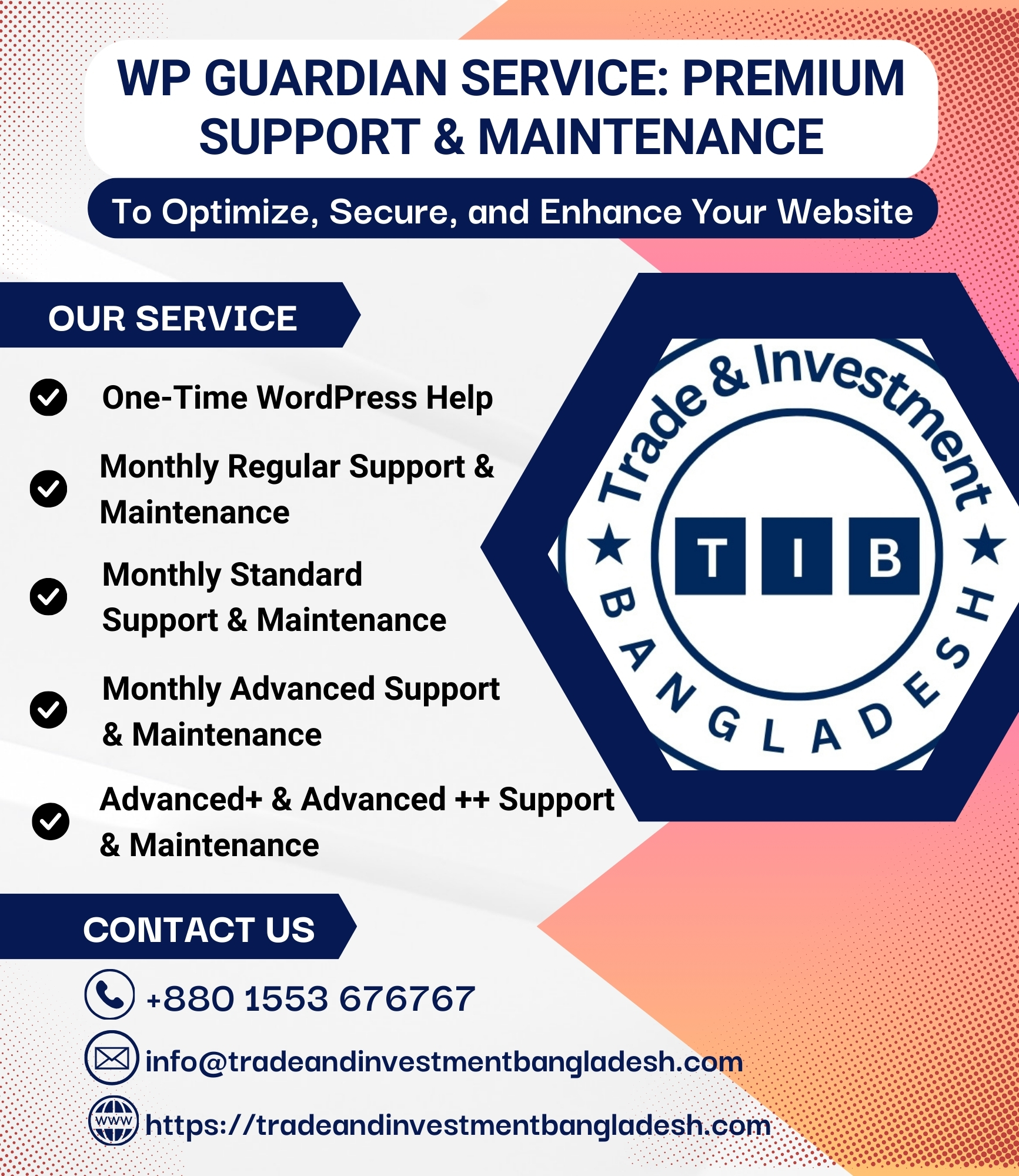Best Digital Marketing Tools for Small Businesses
Md. Joynal Abdin
Founder & CEO, Trade & Investment Bangladesh (TIB)
Introduction to Digital Marketing Tools:
In today’s digital age, having a strong online presence is crucial for the success of small businesses. Digital marketing tools are essential for navigating the complex landscape of online marketing, helping businesses reach their target audiences effectively and efficiently. These tools encompass a wide range of functionalities, from social media management and email marketing to SEO optimization and data analytics.
For small businesses, digital marketing tools offer several key benefits:
- Cost-Effectiveness: Many digital marketing tools are affordable, with various pricing tiers and even free versions available. This allows small businesses to leverage powerful marketing techniques without a significant financial investment.
- Efficiency and Time-Saving: Automation features in digital marketing tools can save businesses a considerable amount of time. Tasks like scheduling social media posts, sending email campaigns, and generating reports can be automated, freeing up time for other essential business activities.
- Targeted Marketing: Digital marketing tools enable businesses to precisely target their ideal customers. With features like demographic targeting, behavior tracking, and personalized content, businesses can create highly relevant marketing campaigns that resonate with their audience.
- Data-Driven Decisions: These tools provide valuable insights and analytics that help businesses understand their performance. Metrics such as website traffic, conversion rates, and customer engagement can guide decision-making and strategy adjustments.
- Scalability: As a business grows, its marketing needs will evolve. Digital marketing tools are scalable, meaning they can grow with the business. Whether a company is just starting out or expanding, these tools can adapt to meet increasing demands.
Overall, digital marketing tools are indispensable for small businesses aiming to enhance their online visibility, engage with their audience, and drive growth. By utilizing these tools, small businesses can compete with larger enterprises and carve out their niche in the digital marketplace.
Social Media Management Tools:
In the realm of digital marketing, social media management tools have become indispensable for small businesses aiming to maximize their online presence and engagement. These tools simplify the process of managing multiple social media accounts, enabling businesses to create, schedule, and analyze content from a single platform.
Key Benefits of Social Media Management Tools:
Streamlined Content Scheduling:
Efficiency: Tools like Hootsuite, Buffer, and Sprout Social allow businesses to schedule posts across various social media platforms in advance. This eliminates the need for constant manual posting and ensures a consistent online presence.
Consistency: Maintaining a regular posting schedule keeps your audience engaged and helps build brand recognition.
Centralized Management:
Unified Dashboard: These tools provide a centralized dashboard where businesses can manage all their social media accounts. This simplifies the process of monitoring and engaging with followers across different platforms.
Time-Saving: Managing multiple accounts from one place saves time and reduces the complexity of social media management.
Enhanced Analytics and Reporting:
Performance Insights: Social media management tools offer robust analytics features, providing insights into metrics such as engagement rates, follower growth, and post performance. Tools like Sprout Social and Zoho Social provide detailed reports that help businesses understand what works and what doesn’t.
Data-Driven Decisions: Access to comprehensive analytics allows businesses to make informed decisions, optimize their content strategy, and improve their overall social media performance.
Improved Engagement:
Real-Time Monitoring: Tools like SocialBee and Agorapulse enable real-time monitoring of social media mentions, comments, and messages. This allows businesses to promptly respond to customer inquiries and engage with their audience.
Customer Relationship Building: Quick and effective engagement fosters stronger relationships with customers, enhancing brand loyalty and satisfaction.
Content Curation and Planning:
Content Libraries: Many social media management tools provide content libraries and curation features, helping businesses to discover and share relevant content that resonates with their audience.
Visual Planning: Tools like Planoly and Later offer visual content planners, which are particularly useful for platforms like Instagram. These planners help businesses maintain a cohesive and visually appealing feed.
Collaboration and Workflow Management:
Team Collaboration: For small businesses with multiple team members handling social media, tools like Trello and Asana integrate with social media management platforms to streamline collaboration. These integrations allow for task assignments, content approvals, and workflow management.
Role-Based Access: Role-based access controls ensure that team members have the appropriate permissions, enhancing security and accountability.
Popular Social Media Management Tools
- Hootsuite: Known for its comprehensive features, Hootsuite supports multiple social media platforms and offers robust analytics, scheduling, and team collaboration tools.
- Buffer: Buffer is user-friendly and focuses on simplicity, providing essential scheduling and analytics features suitable for small businesses.
- Sprout Social: This tool offers advanced analytics, social listening, and customer relationship management, making it ideal for businesses looking to deepen their social media strategy.
- Later: Specializing in visual content planning, Later is popular among businesses focusing on Instagram and other visually-driven platforms.
- Agorapulse: Agorapulse combines scheduling, monitoring, and reporting with an intuitive interface, making it a well-rounded tool for social media management.

Email Marketing Solutions:
Email marketing remains one of the most effective digital marketing strategies for small businesses. It offers a direct line of communication with customers, providing a way to share updates, promotions, and personalized content. Email marketing solutions simplify and enhance this process, making it easier to create, send, and analyze email campaigns.
Key Benefits of Email Marketing Solutions
Cost-Effective Marketing:
Affordable: Many email marketing tools offer tiered pricing plans, including free options for small businesses with limited budgets. This makes email marketing accessible and cost-effective compared to other marketing channels.
High ROI: Email marketing typically delivers a high return on investment (ROI), as it directly targets interested subscribers and customers.
Automation and Personalization:
Automated Campaigns: Tools like Mailchimp, Constant Contact, and SendinBlue allow businesses to set up automated email sequences, such as welcome emails, drip campaigns, and abandoned cart reminders. Automation saves time and ensures timely communication with customers.
Personalized Content: Personalization features enable businesses to tailor emails based on customer behavior, preferences, and demographics. Personalized emails often result in higher engagement and conversion rates.
Segmentation and Targeting:
Audience Segmentation: Email marketing solutions provide robust segmentation options, allowing businesses to divide their email lists into targeted groups based on criteria such as purchase history, engagement level, and geographic location.
Relevant Messaging: Segmentation ensures that subscribers receive content relevant to their interests, increasing the likelihood of engagement and conversion.
Professional Templates and Design:
Email Templates: Most email marketing tools offer a variety of pre-designed templates that can be customized to match a brand’s identity. This makes it easy for businesses to create professional and visually appealing emails without needing design expertise.
Drag-and-Drop Editors: User-friendly drag-and-drop editors allow for easy customization of email templates, enabling businesses to add images, buttons, and other elements with ease.
Analytics and Reporting:
Performance Tracking: Email marketing tools provide detailed analytics on key metrics such as open rates, click-through rates, conversion rates, and unsubscribe rates. Tools like Campaign Monitor and AWeber offer comprehensive reporting features.
Data-Driven Insights: Analyzing these metrics helps businesses understand the effectiveness of their campaigns, identify areas for improvement, and make data-driven decisions to optimize future email marketing efforts.
Compliance and Deliverability:
- Regulatory Compliance: Email marketing solutions help businesses comply with regulations such as the General Data Protection Regulation (GDPR) and the CAN-SPAM Act by offering features like consent management and easy unsubscribe options.
- High Deliverability Rates: Reputable email marketing tools work to ensure high deliverability rates, meaning emails are more likely to reach recipients’ inboxes rather than being marked as spam.
- Popular Email Marketing Solutions
- Mailchimp: Known for its user-friendly interface and robust features, Mailchimp offers a wide range of templates, automation options, and analytics tools, making it a popular choice for small businesses.
- Constant Contact: This tool is praised for its ease of use, extensive template library, and excellent customer support, making it ideal for businesses new to email marketing.
- SendinBlue: Offering both email marketing and SMS marketing capabilities, SendinBlue provides advanced automation features and a flexible pricing structure.
- Campaign Monitor: Known for its beautiful email templates and powerful analytics, Campaign Monitor is a great choice for businesses looking to create visually stunning campaigns.
- AWeber: AWeber offers a comprehensive set of features including automation, segmentation, and detailed analytics, making it a solid choice for small businesses aiming to grow their email marketing efforts.
SEO Optimization Tools:
Search Engine Optimization (SEO) is a critical component of digital marketing that helps small businesses increase their online visibility, drive organic traffic, and improve their search engine rankings. SEO optimization tools are essential for implementing effective SEO strategies, providing insights, and streamlining the optimization process.
Key Benefits of SEO Optimization Tools:
Keyword Research:
Identifying Opportunities: Tools like Ahrefs, SEMrush, and Google Keyword Planner help businesses identify relevant keywords that their target audience is searching for. These tools provide data on search volume, competition, and keyword difficulty.
Long-Tail Keywords: SEO tools can uncover long-tail keywords, which are less competitive and can attract highly targeted traffic.
On-Page SEO Optimization:
- Content Optimization: Tools such as Yoast SEO and Rank Math offer real-time suggestions for optimizing content for target keywords. They analyze factors like keyword density, meta tags, header tags, and readability.
- Technical SEO: Tools like Screaming Frog and Sitebulb help identify technical issues on a website, such as broken links, duplicate content, and slow page speeds, which can affect search engine rankings.
- Competitor Analysis:
- Competitive Insights: SEO tools like SpyFu and Moz allow businesses to analyze their competitors’ SEO strategies, including their top-performing keywords, backlink profiles, and content strategies.
- Benchmarking: Understanding competitors’ strengths and weaknesses helps businesses refine their own SEO tactics and identify opportunities for improvement.
Backlink Analysis and Building:
Backlink Profiles: Tools like Ahrefs and Majestic provide comprehensive insights into a website’s backlink profile, showing the quantity and quality of inbound links.
Link Building Opportunities: These tools help identify potential link-building opportunities by highlighting websites that link to competitors but not yet to the business.
Performance Tracking and Analytics:
SEO Metrics: Tools like Google Analytics and Google Search Console track essential SEO metrics, including organic traffic, bounce rate, and click-through rates. They also provide insights into how users find and interact with a website.
Ranking Monitoring: Tools like SERPWatcher and Moz track keyword rankings over time, allowing businesses to monitor their SEO performance and adjust strategies as needed.
Local SEO:
Local Listings: Tools like BrightLocal and Whitespark help manage local SEO efforts by optimizing business listings on platforms like Google My Business, Yelp, and Bing Places.
Citations and Reviews: These tools also help track and manage online reviews and citations, which are crucial for local search rankings.
Popular SEO Optimization Tools
- Ahrefs: Ahrefs is renowned for its comprehensive suite of SEO tools, including powerful keyword research, backlink analysis, and competitor analysis features. It is a favorite among SEO professionals for its depth of data and user-friendly interface.
- SEMrush: SEMrush offers a wide range of tools for keyword research, competitor analysis, site audits, and more. Its versatility and robust features make it an excellent choice for businesses looking to enhance their SEO efforts.
- Moz: Moz provides various SEO tools that cover keyword research, link building, and site audits. Moz’s intuitive interface and strong community support make it accessible for beginners and experienced users alike.
- Yoast SEO: A popular WordPress plugin, Yoast SEO helps optimize on-page SEO by providing real-time content analysis and suggestions. It is widely used for its simplicity and effectiveness in improving website content.
- Google Analytics and Google Search Console: These free tools from Google are indispensable for tracking website performance, understanding user behavior, and monitoring SEO health. They provide essential data for making informed SEO decisions.
- Screaming Frog: Screaming Frog SEO Spider is a powerful website crawler that helps identify technical SEO issues. It’s invaluable for conducting in-depth site audits and ensuring a website is optimized for search engines.

Content Creation and Management:
Content creation and management are fundamental components of a successful digital marketing strategy. For small businesses, producing high-quality, engaging content can attract and retain customers, build brand authority, and drive organic traffic. Content management tools streamline the process of creating, organizing, and distributing content, making it easier to maintain a consistent and effective content strategy.
Key Benefits of Content Creation and Management Tools
Streamlined Content Creation:
Ease of Use: Tools like Canva and Adobe Spark offer user-friendly interfaces for creating visually appealing graphics, videos, and other content types without the need for advanced design skills.
Templates and Resources: These tools provide a variety of templates, stock photos, and design elements, allowing businesses to quickly produce professional-quality content.
Efficient Content Organization:
Centralized Storage: Content management systems (CMS) like WordPress and Joomla allow businesses to store all their content in one place, making it easy to organize, search, and retrieve when needed.
Version Control: These systems often include version control features, ensuring that the latest versions of content are used and previous versions are archived.
Content Scheduling and Publishing:
Automated Scheduling: Tools like Buffer and Hootsuite enable businesses to schedule content for publication across multiple platforms in advance, ensuring a consistent posting schedule.
Multichannel Distribution: These tools support publishing to various channels, including websites, blogs, and social media, from a single dashboard.
SEO Optimization:
SEO Plugins: CMS platforms often support SEO plugins like Yoast SEO and All in One SEO Pack, which provide real-time suggestions to optimize content for search engines.
Keyword Integration: These tools help incorporate relevant keywords seamlessly into content, enhancing its visibility and ranking potential.
Collaboration and Workflow Management:
Team Collaboration: Tools like Trello and Asana integrate with content management systems to facilitate team collaboration, task assignments, and content approval workflows.
Content Calendars: Editorial calendars, available in tools like CoSchedule and Airtable, help plan and organize content production, ensuring timely delivery and publication.
Analytics and Performance Tracking:
Content Performance Metrics: Tools like Google Analytics and HubSpot track how content performs in terms of engagement, traffic, and conversions. These insights help businesses understand what resonates with their audience and refine their content strategies.
A/B Testing: Some content management tools offer A/B testing capabilities, allowing businesses to test different versions of content to see which performs better.
Popular Content Creation and Management Tools:
- Canva: Canva is an intuitive design tool that enables users to create stunning graphics, presentations, social media posts, and more. It offers a wide range of templates and design elements suitable for beginners and professionals alike.
- Adobe Spark: Adobe Spark provides tools for creating graphics, web pages, and video stories. Its ease of use and professional-quality outputs make it a valuable tool for small businesses.
- WordPress: WordPress is a leading CMS that powers millions of websites. It offers extensive customization options, a vast array of plugins, and a user-friendly interface for managing website content.
- Joomla: Joomla is another powerful CMS that offers flexibility and robust features for content management. It is suitable for more complex websites requiring advanced functionality.
- Buffer: Buffer is a social media management tool that simplifies the scheduling and publishing of content across multiple social media platforms, providing analytics to measure performance.
- Hootsuite: Hootsuite offers comprehensive social media management, including scheduling, monitoring, and analytics, making it an all-in-one solution for managing social media content.
- Trello: Trello is a project management tool that supports content creation workflows. Its board and card system helps teams collaborate and keep track of content tasks and deadlines.
- CoSchedule: CoSchedule combines a marketing calendar, project management, and content scheduling in one tool. It’s designed to streamline content planning and ensure consistent publication.
- HubSpot: HubSpot’s content management and marketing platform offers tools for blogging, SEO, social media, and analytics. Its integrated approach helps businesses manage and optimize their entire content strategy.
Analytics and Reporting Tools:
Analytics and reporting tools are vital for small businesses looking to measure the effectiveness of their digital marketing efforts, gain insights into customer behavior, and make data-driven decisions. These tools help track key performance metrics, visualize data, and generate reports that inform strategy and optimize marketing campaigns.
Key Benefits of Analytics and Reporting Tools
Performance Measurement:
Tracking KPIs: Tools like Google Analytics and Matomo track key performance indicators (KPIs) such as website traffic, bounce rates, session duration, and conversion rates. These metrics help businesses understand how well their marketing efforts are performing.
Customizable Dashboards: Many analytics tools offer customizable dashboards that allow businesses to monitor the metrics most relevant to their goals in real-time.
Customer Insights:
Behavioral Analysis: Analytics tools provide insights into how customers interact with a website, including which pages they visit, how long they stay, and what actions they take. This information is crucial for optimizing user experience and improving engagement.
Audience Segmentation: Tools like Google Analytics and HubSpot can segment audiences based on demographics, behavior, and other criteria, helping businesses tailor their marketing strategies to specific customer groups.
Marketing Campaign Optimization:
Campaign Tracking: Tools like SEMrush and HubSpot track the performance of marketing campaigns across various channels, including email, social media, and paid advertising. This helps businesses identify which campaigns are most effective and allocate resources accordingly.
A/B Testing: Many analytics tools offer A/B testing capabilities, allowing businesses to compare different versions of marketing materials to see which performs better and make informed decisions.
Comprehensive Reporting:
Automated Reports: Analytics tools can generate automated reports that provide an overview of performance metrics over specific periods. This saves time and ensures consistent reporting.
Data Visualization: Tools like Tableau and Power BI offer advanced data visualization capabilities, transforming raw data into easily interpretable charts and graphs that highlight trends and insights.
ROI Calculation:
Revenue Attribution: Analytics tools help attribute revenue to specific marketing activities, providing a clear picture of which efforts are driving sales and which are not. This is essential for calculating return on investment (ROI) and justifying marketing spend.
Cost Analysis: These tools also track the costs associated with various marketing channels, helping businesses identify the most cost-effective strategies.
Popular Analytics and Reporting Tools
- Google Analytics: Google Analytics is a widely-used, free tool that provides comprehensive insights into website traffic and user behavior. It offers a range of features, including audience segmentation, goal tracking, and e-commerce reporting.
- Matomo: Matomo is an open-source analytics platform that emphasizes data privacy. It offers features similar to Google Analytics, including visitor tracking, heatmaps, and A/B testing, with the added benefit of data ownership.
- SEMrush: SEMrush is an all-in-one marketing tool that includes robust analytics and reporting capabilities. It helps businesses track SEO performance, analyze competitor strategies, and monitor the effectiveness of online marketing campaigns.
- HubSpot: HubSpot’s marketing platform includes powerful analytics and reporting tools that cover website performance, lead generation, and campaign tracking. Its integrated approach allows for seamless data analysis across various marketing activities.
- Tableau: Tableau is a leading data visualization tool that transforms complex data sets into interactive, shareable dashboards. It is ideal for businesses looking to gain deeper insights through advanced visual analytics.
- Power BI: Microsoft Power BI offers powerful data visualization and business intelligence capabilities. It integrates with various data sources to provide comprehensive analytics and reporting, making it suitable for businesses of all sizes.
- Kissmetrics: Kissmetrics focuses on behavioral analytics and customer engagement, providing detailed insights into how users interact with a website and move through the sales funnel. It’s particularly useful for optimizing user experience and increasing conversions.
- Looker: Looker, part of Google Cloud, is a business intelligence tool that provides real-time data analytics and reporting. Its customizable dashboards and powerful data exploration capabilities help businesses make data-driven decisions.

Customer Relationship Management (CRM) Systems:
Customer Relationship Management (CRM) systems are essential tools for small businesses looking to enhance their customer interactions, improve sales processes, and foster long-term relationships. CRMs centralize customer data, streamline communication, and provide valuable insights that help businesses better understand and serve their customers.
Key Benefits of CRM Systems
Centralized Customer Data:
Unified Database: CRM systems like Salesforce and HubSpot provide a single repository for storing customer information, including contact details, interaction history, and purchase records. This centralization makes it easy for businesses to access and manage customer data.
Data Accuracy: By consolidating customer information, CRMs help maintain accurate and up-to-date records, reducing the risk of data duplication and errors.
Enhanced Customer Interaction:
Personalized Communication: CRMs enable businesses to segment their customer base and tailor communication based on individual preferences and behaviors. Personalized interactions foster stronger relationships and increase customer satisfaction.
Automated Follow-Ups: Tools like Zoho CRM and Freshsales automate follow-up emails, reminders, and task assignments, ensuring timely and consistent customer engagement.
Improved Sales Management:
Sales Pipeline Management: CRMs provide visual sales pipelines that help track leads and opportunities through various stages of the sales process. This visibility enables sales teams to prioritize tasks and close deals more effectively.
Lead Scoring and Qualification: CRM systems often include lead scoring features that rank leads based on their likelihood to convert, allowing sales teams to focus on high-potential prospects.
Better Customer Support:
Case Management: CRMs like Zendesk and ServiceNow offer case management features that streamline the handling of customer support tickets and inquiries. This ensures that issues are resolved promptly and efficiently.
Knowledge Base Integration: Many CRMs integrate with knowledge bases and self-service portals, providing customers with quick access to information and reducing the workload on support teams.
Insightful Analytics and Reporting:
Performance Metrics: CRMs generate reports on key performance indicators such as sales conversion rates, customer retention rates, and response times. These insights help businesses measure their performance and identify areas for improvement.
Forecasting: Advanced CRM systems offer sales forecasting tools that predict future sales based on historical data and current trends, aiding in strategic planning and decision-making.
Collaboration and Workflow Automation:
Team Collaboration: CRMs facilitate collaboration among team members by providing shared access to customer information and communication history. This ensures that everyone is on the same page and enhances team productivity.
Workflow Automation: CRMs automate routine tasks such as data entry, lead assignment, and email marketing, freeing up time for employees to focus on higher-value activities.
Popular CRM Systems:
- Salesforce: Salesforce is a leading CRM platform known for its comprehensive features, scalability, and customization options. It offers solutions for sales, service, marketing, and more, making it suitable for businesses of all sizes.
- HubSpot CRM: HubSpot CRM is a popular choice for small businesses due to its user-friendly interface and robust free plan. It includes features for contact management, email tracking, and sales pipeline management.
- Zoho CRM: Zoho CRM offers a wide range of features at an affordable price, including lead management, sales automation, and analytics. It is highly customizable and integrates well with other Zoho applications.
- Freshsales: Freshsales by Freshworks is known for its intuitive design and powerful features, such as AI-based lead scoring, built-in phone, and email integration. It is ideal for small to mid-sized businesses.
- Zendesk: Zendesk CRM focuses on customer support and service management, providing tools for ticketing, live chat, and knowledge base management. It is excellent for businesses prioritizing customer service.
- Pipedrive: Pipedrive is a sales-focused CRM that emphasizes pipeline management and activity tracking. Its visual interface and simplicity make it a great choice for sales teams.
- ServiceNow: ServiceNow offers a robust CRM solution that integrates IT service management with customer service management, making it suitable for businesses with complex service operations.
PPC and Advertising Platforms:
Pay-Per-Click (PPC) advertising is a powerful digital marketing strategy that allows businesses to reach their target audience with highly targeted ads. PPC platforms provide the infrastructure and tools needed to create, manage, and optimize advertising campaigns across various channels, including search engines, social media, and display networks.
Key Benefits of PPC and Advertising Platforms
Targeted Advertising:
Audience Targeting: PPC platforms like Google Ads and Facebook Ads offer advanced targeting options based on demographics, interests, behavior, and keywords. This allows businesses to reach specific audience segments likely to be interested in their products or services.
Geo-Targeting: PPC campaigns can be localized to target users in specific geographic locations, ensuring ads are shown to relevant audiences.
Immediate Visibility:
Instant Results: PPC advertising provides immediate visibility on search engine results pages (SERPs) and social media feeds, allowing businesses to quickly generate traffic and leads.
Controlled Budget: PPC platforms offer flexible budgeting options, allowing businesses to set daily or monthly spending limits and adjust bids in real-time to maximize ROI.
Measurable Results:
Performance Tracking: PPC platforms provide comprehensive analytics and reporting tools that track key metrics such as clicks, impressions, conversions, and cost-per-acquisition (CPA). This allows businesses to measure the effectiveness of their campaigns and make data-driven decisions.
Conversion Tracking: Many PPC platforms offer conversion tracking features that attribute conversions to specific ads and keywords, helping businesses optimize their campaigns for better results.
Customizable Ad Formats:
- Text Ads: PPC platforms like Google Ads allow businesses to create text-based ads that appear at the top of search engine results pages (SERPs) when users search for relevant keywords.
- Display Ads: Platforms like Google Display Network (GDN) and Facebook Ads enable businesses to create visually appealing display ads that appear on websites, apps, and social media platforms.
- Video Ads: PPC platforms like YouTube Ads and Facebook Video Ads allow businesses to create video ads that appear before, during, or after video content, capturing users’ attention and driving engagement.
- Ad Optimization:
- Ad Testing: PPC platforms support A/B testing (split testing) of ad creatives, headlines, and landing pages to identify the most effective combinations and improve campaign performance.
- Keyword Optimization: PPC platforms provide keyword research tools and bidding strategies that help businesses identify relevant keywords, optimize bids, and improve ad placement.
Remarketing and Retargeting:
Remarketing: PPC platforms offer remarketing capabilities that allow businesses to re-engage users who have previously visited their website or interacted with their ads. Remarketing ads appear to these users as they browse other websites or social media platforms, increasing brand recall and conversion rates.
Retargeting: Similar to remarketing, retargeting involves targeting users with personalized ads based on their past interactions with a website or app. Retargeting campaigns help businesses recapture lost leads and nurture them through the sales funnel.
Popular PPC and Advertising Platforms:
- Google Ads: Google Ads is the largest and most widely used PPC platform, offering advertising opportunities on Google search results pages, display networks, YouTube, and more. It provides extensive targeting options, keyword bidding, and performance tracking tools.
- Facebook Ads: Facebook Ads enables businesses to create highly targeted ads that appear on Facebook, Instagram, Messenger, and Audience Network. It offers advanced audience targeting based on demographics, interests, and behaviors.
- Microsoft Advertising: Formerly known as Bing Ads, Microsoft Advertising allows businesses to advertise on the Bing search engine, Yahoo, and AOL. It offers similar targeting options to Google Ads and can be an effective complement to a Google Ads campaign.
- LinkedIn Ads: LinkedIn Ads is a popular platform for B2B advertising, offering targeting options based on job title, company size, industry, and more. It is ideal for businesses looking to reach professionals and decision-makers.
- Twitter Ads: Twitter Ads enables businesses to promote tweets, profiles, and trends to reach a targeted audience on Twitter. It offers targeting options based on interests, demographics, and keywords.
- Amazon Advertising: Amazon Advertising allows businesses to promote their products on Amazon’s marketplace, search results, and product detail pages. It offers sponsored product ads, display ads, and video ads to reach shoppers at various stages of the buying journey.

Benefits of Using Digital Marketing Tools:
Digital marketing tools have revolutionized the way businesses promote their products and services online. From increasing brand visibility to analyzing customer behavior, these tools offer a wide range of benefits that can significantly enhance a business’s marketing efforts. Here are some key advantages of using digital marketing tools:
- Increased Reach and Visibility: Digital marketing tools enable businesses to reach a global audience through various online channels such as search engines, social media, email, and websites. This expanded reach helps businesses connect with potential customers regardless of geographical location.
- Cost-Effectiveness: Compared to traditional marketing methods like print advertising or TV commercials, digital marketing tools are often more cost-effective. Many digital marketing platforms offer flexible pricing options, allowing businesses to allocate their budget efficiently and optimize their return on investment (ROI).
- Targeted Marketing: Digital marketing tools allow businesses to target specific demographics, interests, behaviors, and locations with their marketing campaigns. This targeted approach ensures that marketing messages are delivered to the most relevant audience, increasing the likelihood of engagement and conversion.
- Data-Driven Decision Making: Digital marketing tools provide valuable insights and analytics that help businesses understand their audience, track campaign performance, and measure the effectiveness of their marketing efforts. By analyzing data such as website traffic, conversion rates, and customer behavior, businesses can make informed decisions to optimize their marketing strategies.
- Automation and Efficiency: Many digital marketing tools offer automation features that streamline repetitive tasks such as email marketing, social media scheduling, and lead nurturing. Automation not only saves time but also improves efficiency by ensuring that marketing activities are executed consistently and on schedule.
- Improved Customer Engagement: Digital marketing tools facilitate two-way communication between businesses and their customers, allowing for real-time interaction and engagement. Features such as social media monitoring, live chat support, and personalized email campaigns help businesses build meaningful relationships with their audience and foster customer loyalty.
- Flexibility and Adaptability: Digital marketing tools offer flexibility and adaptability, allowing businesses to quickly adjust their marketing strategies based on changing market trends, consumer preferences, and competitive landscapes. With digital marketing, businesses can experiment with different tactics, measure results, and iterate accordingly to stay ahead of the curve.
- Brand Consistency: Digital marketing tools help maintain brand consistency across various online channels by providing templates, guidelines, and scheduling options. Consistent branding builds trust and credibility with customers and ensures a cohesive brand experience across all touchpoints.
- Accessibility and Scalability: Digital marketing tools are accessible to businesses of all sizes, from startups to large corporations, offering scalable solutions that can grow with the business. Whether it’s a small email campaign or a comprehensive multi-channel marketing strategy, digital marketing tools provide the resources and capabilities needed to succeed in today’s digital landscape.
In conclusion, digital marketing tools offer numerous benefits that can help businesses increase their online visibility, engage with their audience, and drive growth. By leveraging these tools effectively, businesses can stay competitive, adapt to changing market dynamics, and achieve their marketing objectives more efficiently and effectively than ever before.
How to Choose the Right Tools for Your Business?
Choosing the right tools for your business is crucial for maximizing efficiency, productivity, and ultimately, success. With the plethora of options available in the digital landscape, selecting the most suitable tools can be overwhelming. Here are some steps to help you choose the right tools for your business:
- Define Your Goals and Objectives: Begin by clarifying your business goals and objectives. Determine what you aim to achieve with the tools you select. Whether it’s increasing sales, improving customer service, or enhancing brand visibility, align your tool selection with your overarching business goals.
- Assess Your Needs: Conduct a thorough assessment of your business needs across various departments and functions. Identify pain points, inefficiencies, and areas where automation or optimization could make a significant impact. Consider factors such as team size, budget constraints, and scalability requirements.
- Research and Compare Options: Explore the market to identify potential tools that address your specific needs. Research online reviews, case studies, and customer testimonials to gain insights into the features, functionality, and usability of each tool. Create a shortlist of tools that align closely with your requirements.
- Consider Integration Capabilities: Evaluate how well the tools you’re considering integrate with your existing systems and workflows. Seamless integration between tools ensures smooth data flow and avoids duplication of efforts. Look for tools that offer robust APIs or native integrations with other platforms you use.
- Test and Trial: Before making a final decision, take advantage of free trials or demo versions offered by the tools on your shortlist. Test the features, user interface, and overall usability to assess whether the tool meets your expectations and provides value for your business.
- Evaluate Costs and ROI: Consider the costs associated with implementing and maintaining the tools, including subscription fees, setup costs, and training expenses. Evaluate the potential return on investment (ROI) each tool offers in terms of time saved, efficiency gains, and business outcomes.
- Seek Feedback and Recommendations: Gather input from stakeholders within your organization, including team members who will be using the tools on a day-to-day basis. Solicit feedback on their preferences, pain points, and user experience to ensure buy-in and adoption.
- Assess Vendor Reputation and Support: Evaluate the reputation and track record of the tool vendors. Choose reputable vendors with a history of reliability, security, and customer satisfaction. Additionally, consider the quality of customer support and the availability of resources such as documentation, tutorials, and training materials.
- Plan for Scalability and Future Growth: Anticipate future needs and ensure that the tools you select can scale alongside your business. Choose flexible solutions that can accommodate growth, evolving requirements, and changes in technology or market trends.
- Make Informed Decisions: Finally, weigh all the factors and considerations carefully before making your decisions. Prioritize the tools that offer the best fit for your business needs, align with your goals, and provide the most value in terms of functionality, usability, and ROI.
By following these steps and taking a strategic approach to selecting tools for your business, you can make informed decisions that drive efficiency, productivity, and success across your organization.

Closing Remarks:
In today’s competitive digital landscape, leveraging the right digital marketing tools can make a significant difference for small businesses. From enhancing your online visibility and engaging your audience to driving sales and optimizing your marketing strategies, these tools offer a wide range of benefits that are crucial for business growth and success.
Choosing the right digital marketing tools involves understanding your business needs, defining clear objectives, and carefully evaluating the options available. By investing in the appropriate tools and technologies, you can streamline your marketing efforts, make data-driven decisions, and achieve better results.
We invite business owners to explore the comprehensive digital marketing services offered by Trade & Investment Bangladesh (TIB). Our expert team is dedicated to helping small businesses harness the power of digital marketing to reach their goals. For more details, please contact us at +8801553676767 or visit our website at Trade & Investment Bangladesh.
Take the first step towards transforming your business with top-tier digital marketing solutions tailored to your needs. Partner with TIB and experience the benefits of strategic, effective, and results-driven digital marketing.
Best Digital Marketing Tools for Small Businesses

Mr. Md. Joynal Abdin is a Business Consultant & Digital Marketer based in Dhaka, Bangladesh. He is the Founder & CEO, of Trade & Investment Bangladesh; Secretary General of Brazil Bangladesh Chamber of Commerce & Industry (BBCCI), and Co-Founder & CEO of Bangladesh Trade Center. Previously he served at Dhaka Chamber of Commerce & Industry (DCCI) as Executive Secretary; DCCI Business Institute (DBI) as Executive Director; SME Foundation as Deputy Manager; and the Federation of Bangladesh Chambers of Commerce & Industry (FBCCI) as Assistant Secretary.
The list of services Mr. Abdin is offering includes but is not limited to Business Mentorship, Business Research and Documentation, Export Market Selection and Product Positioning at Home and Abroad; Buyers-Sellers Matchmaking; Website Development; Search Engine Optimization (SEO); and Social Media Marketing etc.


